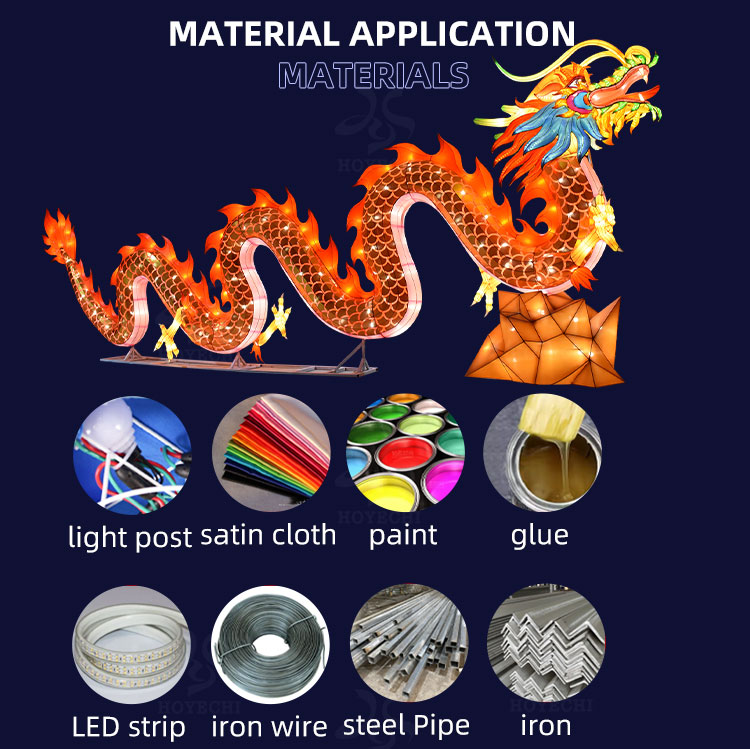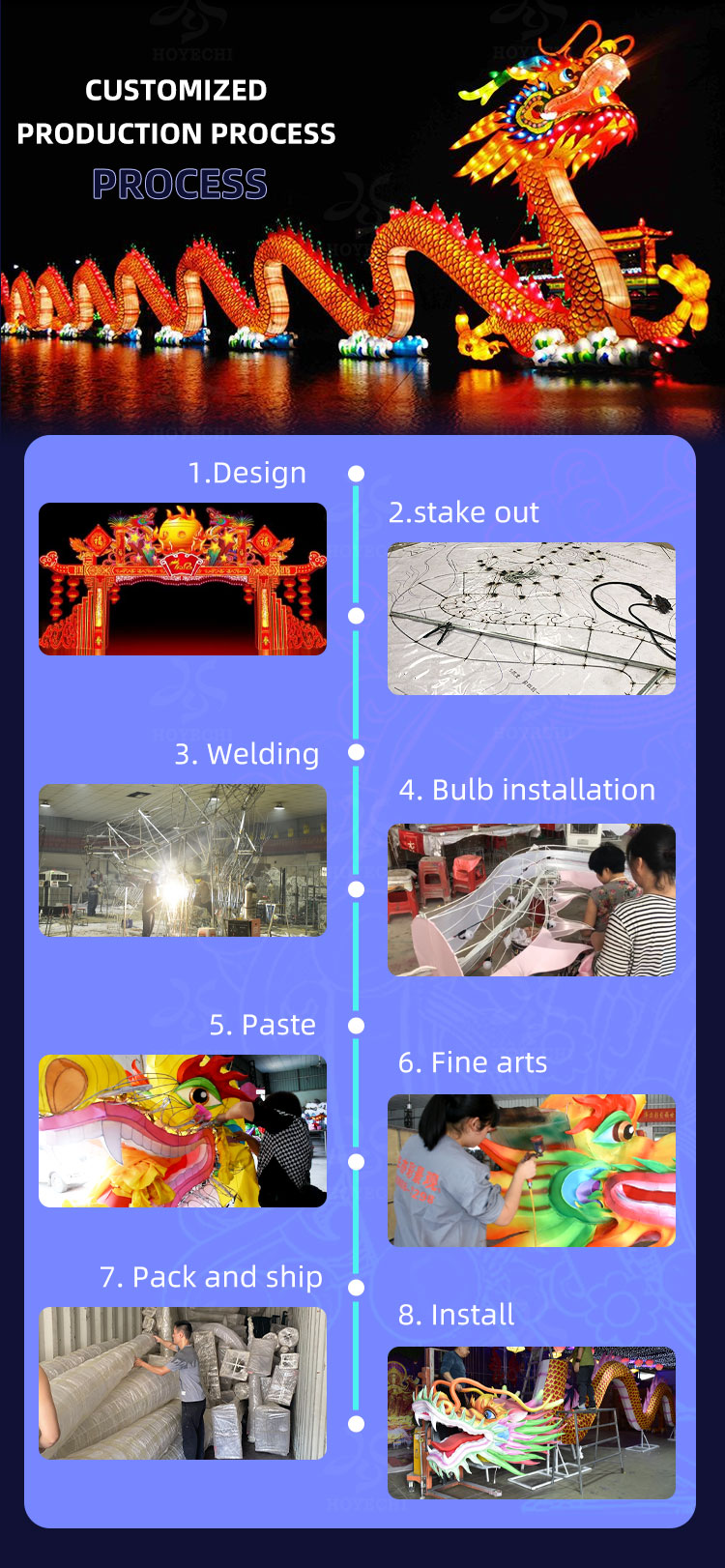Dragon Lantern: When a “Vessel of Light” Carries Culture, Night Gains a Story
In East Asian aesthetics, the dragon is not a monster; it is a cosmogram that unites rivers, seas, clouds, and thunder. When it takes shape as a dragon lantern, light is no longer mere illumination—it becomes a tangible form of legend, wishes, and festival spirit. The product below recreates traditional meaning with contemporary materials and craft, so a night walk is not only beautiful, but also rooted and intelligible.
I. Cultural Intention: Why the Dragon Works as a Nighttime Landmark
-
Auspice and Guardianship: The dragon governs clouds and rain and protects all beings—perfect for an entrance icon or waterside axis that “guards” the site.
-
Festivals and Reunion: In Lantern Festivals, grand openings, and coastal rituals, lighting the dragon kindles collective vitality.
-
Urban Narrative: The body of the dragon “moves” like calligraphy, bending the route into a story. Each section is a chapter: opening (welcome) → turning (market) → lifting (plaza) → closing (water).
II. Materials as Metaphor: Translating Tradition with Modern Media
-
Light-post satin cloth (lantern satin): A silky sheen like “silk scales,” translucent without glare—bringing the visual language of brocade back into the night.
-
Paint: A palette guided by the Five Virtues—gold (nobility), red (ritual), cyan/green (vitality), black (water), white (clarity). Every stroke “breathes life” into the dragon.
-
Glue (adhesive): The craft spirit of mounting: scattered parts become a community.
-
LED strip: Contemporary “gentle fire.” Flow programs make the dragon’s breath appear and fade.
-
Iron wire: Expressive “bone lines” that draw force and turning points.
-
Steel pipe & angle iron: The spine and base—wind-resistant and weather-hardy. Reliable structure is what makes ceremony believable.
Materials aren’t a checklist; they are commentary. Each one adds a cultural aside.
III. The Eight Steps of Craft
-
Design: Choose a story theme and a calligraphic body line—the dragon is written before it is built; first, set the qi.
-
Stake out: Full-scale linework on the ground—laying the site’s “veins.”
-
Welding: Iron wire and steel pipe form the skeleton—now the dragon has stance and sinew.
-
Bulb (Lighting) installation: Bringing “fire” and “breath” inside—defining rhythm and layered brightness.
-
Paste (mounting the skin): Satin goes on; scales appear; corner turns reveal workmanship.
-
Fine arts (color & detailing): Cloud and flame motifs, scale highlights, and finally the dotting of the eyes to gather spirit.
-
Pack and ship: With craft notes and a culture card—the lantern leaving the factory is culture going abroad.
-
Install: Numbered plug-and-play; on site, tune music and light sequences to complete the lighting rite.
IV. A Readable Form Language: Let Visitors Understand at a Glance
-
Head: Upturned = auspicious beginning; pearl in mouth = “gathering energy.”
-
Scales: Honeycomb facets layered with semi-translucent skin—“water light on scale light.”
-
Flame motifs: Not violent fire, but the line of life that never ceases.
-
Rock-base pedestal: Alludes to Classic of Mountains and Seas—“mountain follows the dragon; clouds follow the dragon.”
Pair with drums plus xun/flute timbres; traditional instruments interweave with modern low frequencies so past and present share a pulse.
V. Scenes and Rites: Turning a Lantern Fair into a Culture Class
-
Eye-Dotting Ceremony: Children or elders dot the eyes at opening—where attention goes, spirit arrives.
-
Wish Ribbons: Lightweight hooks along the body for visitors’ wishes; small lamps sway in the breeze.
-
Riddles & Rubbings: Make scale and cloud patterns into rubbing cards, so kids take home more than photos.
-
Waterside Linkage: If by a lake, program “dragon spitting the pearl” with mist—honoring the dragon’s water virtue.
VI. Global Expression: Helping the Dragon Travel and Be Understood
Across cultures, “dragon” can mean power or protection. We center the narrative on goodwill, blessing, and abundance, avoiding conquest imagery. Colors emphasize a harmonious triad of gold/red/cyan, with bilingual signage explaining the dragon’s ecological and ethical role in East Asian tradition.
For overseas runs, provide multilingual guide cards and hands-on workshops (stenciled coloring, mini-frame lashing) so a viewing becomes a cross-cultural exchange.
VII. Sustainability & Care: Tradition Beyond a One-Off Buzz
-
Modular Sections: Body splits for storage and touring; refresh effects by upgrading light sequences.
-
Weatherability: Waterproof, dustproof, UV-resistant; structure engineered to local wind codes.
-
Educational Extension: Turn “skeleton–mounting–coloring” into an intangible-heritage class for long-term programming.
VIII. Fit & Specs
-
Length: 18–60 m (modular, customizable)
-
Power: Low-voltage by zones; timer and holiday programs supported
-
Installation: Numbered plug-and-play; baseplate/ballast/ground anchors; wiring diagram & video included
-
Logistics: Crated, shock- and moisture-protected; culture brief, dimension list, and maintenance sheet in every box
Conclusion
This dragon is more than something that “shines.” It threads season, ritual, craft, and urban memory into a breathing scroll. When the lights are on, there is applause; when they go dark, the local culture remains illuminated.
If your site is ready for stories, this dragon will finish the chapter for the night.
Post time: Sep-23-2025







